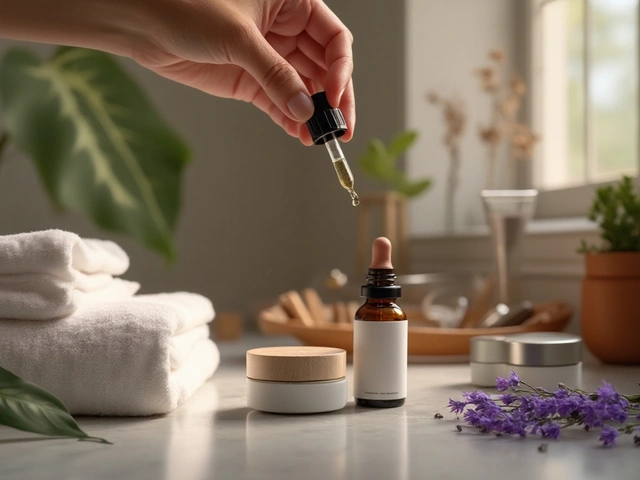Natural Remedies That Work: Simple, Safe, Everyday Fixes
Most people reach for pills first—what if simple natural remedies could help you feel better faster? Here are practical options you can try at home, backed by common sense and real results. Use them wisely and stop wasting time on vague tips.
Herbal teas: ginger for nausea, peppermint for digestion, chamomile for sleep. Brew fresh or use high-quality bags. For nausea, sip ginger tea slowly; for bloating, a cup of peppermint after meals can ease gas. Chamomile 30 minutes before bed calms the mind and helps you fall asleep.
Heat and cold: sore muscles respond fast. Apply a warm compress or bath for tight, aching muscles to increase blood flow. For recent injuries or sharp pain, use a cold pack for 15–20 minutes to reduce swelling. Alternate heat and cold only once the acute phase is over.
Easy fixes for stress, sleep, and mood
Breathing techniques cut stress in minutes. Try box breathing: inhale 4, hold 4, exhale 4, hold 4. Do four cycles when you feel tense. Short daily meditation—five to ten minutes—improves mood over weeks. Use apps if you need guided sessions.
Move daily in ways you enjoy. A brisk 20-minute walk raises mood, helps digestion, and supports sleep. If your body needs more care, sports massage can speed recovery and lower muscle tension—great for people who exercise often.
Food-based remedies and gut health
What you eat changes how you feel. Fermented foods like yogurt, kefir, sauerkraut, and miso add friendly bacteria that support gut health. If you have persistent digestive problems, try a short diary of foods and symptoms to spot triggers. Small, consistent changes beat drastic diets.
Smart snacking keeps cravings in check. Combine protein and fiber: apple slices with nut butter, Greek yogurt with berries, or hummus with carrot sticks. These choices steady blood sugar and help stress-eating.
Topical and simple herbal care: honey works for minor coughs and sore throats—take a teaspoon with warm water. Aloe vera gel soothes sunburn and minor skin irritation. Test new topical herbs on a small skin area first to avoid allergic reactions.
Safety first: natural doesn’t always mean safe. Tell your healthcare provider about herbs or supplements you use—some interact with medications or affect conditions like blood pressure and pregnancy. Stop any remedy that causes new symptoms and seek medical help for high fever, severe pain, heavy bleeding, or sudden breathlessness.
When to get professional help: if symptoms last more than a week, get worse, or limit daily life, see a clinician. Natural remedies are best for mild, short-term issues or alongside professional care.
Try one simple change at a time. Track how you feel for a week, then tweak. Natural remedies work best when you treat them like habits—small, sensible steps that add up. Want to pick one to start? Try ginger tea after meals for two weeks and note the difference. Share results with a friend or your clinician to find what really works for you start today now.
Sports Massage: The Real Fix for Sports-Related Injuries
Sports massage isn’t just for pro athletes. This hands-on therapy speeds up recovery, tackles stubborn muscle pain, and keeps everyday players in the game. With proven techniques that boost blood flow and ease tension, sports massage helps lower your risk of getting sidelined. Discover who can benefit, what to expect, and how to pick the right therapist. Get tips on making the most of your next session, straight from someone who knows the ropes.
View MoreAromatherapy for Pain Relief: How Scents Are Changing the Game
Aromatherapy is getting a lot of buzz for helping with pain relief, especially for those looking for something outside regular medicine. This article takes a close look at how certain scents and essential oils can actually make a difference when you’re hurting. You’ll find out which oils are best, how to use them safely, and what science says about their effects. We’ll sort out the hype from the facts and give some real-life tips you can use at home. No fluff—just what works and what to watch out for.
View MoreTurmeric Health Benefits: Why This Golden Spice Stands Out
Turmeric isn’t just a trendy spice—it’s one of the most well-studied ingredients for health. This article unpacks what makes turmeric so special, from its main active compound curcumin to real ways it can boost well-being. You’ll discover how turmeric helps with inflammation, digestion, and even brain function. Practical tips for getting more turmeric in your routine are inside, plus a look at common mistakes to avoid. Here’s everything you wish someone told you about adding turmeric to your day.
View MoreAromatherapy Power: Transforming Health and Wellness Daily
Aromatherapy isn't just about nice scents—it taps into real science to support your physical and mental health. This article breaks down how specific essential oils can calm your mind, boost your mood, and help your body bounce back from stress. Expect practical tips on choosing the right oils, easy ways to use them at home, and advice to stay safe. If you're curious about simple habits that pack a punch, you're in the right place. Discover how to make aromatherapy part of your everyday routine without the guesswork.
View More








